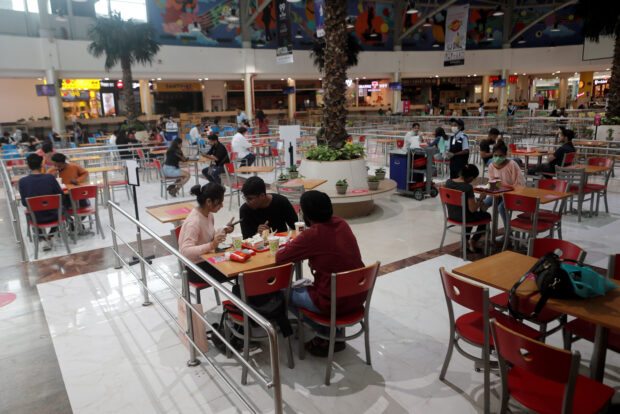
People eat at a food court at a mall after they reopened amidst the spread of the coronavirus disease (COVID-19) in Mumbai, India, October 8, 2020. REUTERS/Francis Mascarenhas/File photo
BENGALURU – India’s dominant services sector expanded at its fastest pace in 13 years last month as demand increased significantly despite elevated inflationary pressures, a business survey showed on Thursday.
S&P Global’s India services purchasing managers’ index rose to 62.3 in July from June’s 58.5, confounding expectations in a Reuters poll for a dip to 58.0. It was the highest index reading since June 2010 and has remained above the 50-mark that separates growth from expansion for two years.
“The resilience of the service sector underscores its vital role in fueling India’s economy, with the PMI results for July so far pointing to a notable contribution from the sector to overall GDP for the second fiscal quarter,” noted Pollyanna De Lima, economics associate director at S&P Global Market Intelligence.
India’s economy is expected to grow 6.2 percent in the July-September quarter, according to the latest Reuters survey.
READ: PH, India to grow fastest in Asia-Pacific in 2023, says Moody’s Analytics
Overall demand remained strong. While the new business sub-index showed demand had risen since August 2021, the pace of growth was the highest since June 2010.
International demand also gathered steam, rising significantly in July and was the second-strongest since the series started in September 2014.
Inflation in India rose to 4.81 percent in June, due to surging vegetables prices. Though within the Reserve Bank of India’s (RBI) 2 percent-6 percent target range, the central bank was not expected to cut rates anytime soon.
READ: India’s retail inflation rose more than expected in June on higher food prices
READ: India rate cut bets pushed to mid-2024 amid inflation jump – traders
Operating costs rose at the fastest pace since June 2022 and firms passed on some of that burden to customers, albeit at the slowest pace in three months as they were cautious about their pricing strategies.
“Looking at PMI price indices in recent months, it seems that competitive advantage continued to support demand for Indian services, with increases in output prices here modest relative to several other nations,” added De Lima.
Although the future activity sub-index, which measures optimism, slipped from June’s six-month high over concerns surrounding extreme weather, the year-ahead outlook remained strong.
Firms continued to add headcount, stretching the current sequence of hiring to more than a year. However, little-changed from June the rate of hiring remained weak.
A manufacturing sector PMI released on Monday dipped to 57.7 in July but strong services activity meant the overall S&P Global India Composite PMI Output Index rose to a 13-year high of 61.9.